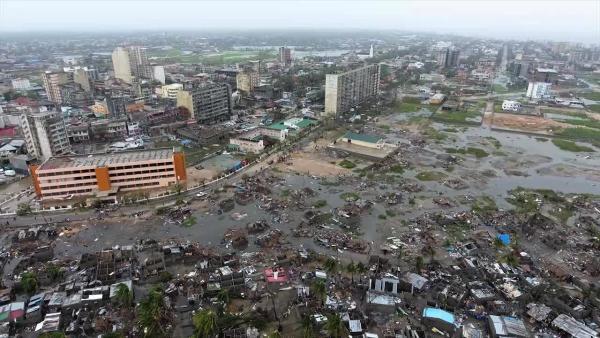
- EU and European Investment Bank support water and flood mitigation investment in areas hit by cyclones last year.
- The €100 million loan, blended with €10 million grant, to improve public health and climate resilience, and reduce the spread of COVID-19.
- EIB delivering on a pledge made by the EU at 2019 International Donors’ Conference in Beira.
Financing agreed today is part of a €200 million pledge made by the EU during the 2019 Beira International Donor Conference. This backed Mozambique’s Disaster Recovery Framework, which sets the vision, strategic objectives and principles for recovery and reconstruction following the devastations caused by Tropical Cyclones Idai and Kenneth.
The €100 million loan to the Ministry of Economy and Finance will allow the Cabinet for Post-Idai and Kenneth Reconstruction, responsible for managing and monitoring the operation, to build resilience for future adversity through improved water supply, wastewater and drainage infrastructure in affected cities. In addition to this loan, the EU provides €10 million in grant to add Technical Assistance to this operation. The agreement was signed today in a virtual event by the Minister of Economy and Finance, Adriano Maleiane, the EU Ambassador to Mozambique, António Sánchez-Benedito Gaspar, and EIB-director María Shaw Barragán.
EIB Vice-President, Thomas Östros said: “Security of supply of clean water, and ensuring that water infrastructure is protected amid the current climate emergency, are priorities for the European Investment Bank. As the largest international lender to the water sector worldwide, the EIB is glad to finance and provide its expertise to this project in Mozambique, this will make local water infrastructure safer and more efficient. EU backed investment will improve public health, even more important during the global COVID-19 pandemic.”
In turn, His Excellency the Minister of Economy and Finance, Adriano Maleiane, representing the Government of Mozambique, stated that “the government will invest in the infrastructure and sectors chosen for this financing, including water, sanitation and drainage, implementing the resilience component of 'Rebuild Better', in line with the commitments set out in the Sustainable Development Goals and the Disaster Risk Reduction Framework adopted in Sendai, which we assumed, under the principle of accountability and transparency in Resource Management.” The Minister added that “the investment will improve public health, make cities more resilient and cleaner, and reduce the risks of future disasters.”
This investment will be used to ‘Build Back Better’ the infrastructure that was damaged by the cyclones and subsequent floods, improving public health and making cities more resilient to climate-related risks and extreme events. New wastewater infrastructure will also help to avoid untreated slop flowing into rivers, tying the project into the worldwide Clean Ocean Initiative.
Background information
The EIB has a long track record of financing operations in Mozambique both under own resources and third party resources, although this will be the first post-disaster climate change resilience operation structured by the Bank in Mozambique. The EIB is exceptionally financing 100% of the reconstruction work given the climate disaster nature of the necessary rebuilding work.
The EU has already mobilised € 90 million in humanitarian and development assistance for Mozambique in the aftermath of the 2019 disaster.
Learn more at:
EU cooperation with Mozambique
EU support to Cyclone Idai in April 2019
Background information:
Following the catastrophe in 2019, the EIB Group, in an effort coordinated by the EIB Institute, had already raised funds among its staff, which were topped up by the Bank itself. An amount of EUR 261 695 was allocated to nine NGOs active in the region: SOS Villages d’Enfants Monde (Luxembourg); SAVE THE CHILDREN (Spain); UNICEF (Luxembourg); Malteser International (Germany); CARE (Luxembourg); CARITAS (Luxembourg); British Red Cross (UK); Handicap International (Luxembourg); and Médecins du Monde (Luxembourg).
The donation was used to provide emergency aid in the form of life-saving food and water, shelter and equipment (tarpaulins, mosquito nets, blankets, survival kits…) as well as health care and psychological support. It also helped finance vital sanitation work reducing the risk of water-borne diseases in the aftermath of the disaster.
https://institute.eib.org/2019/06/cyclone-in-southern-africa-eib-donation-results/



